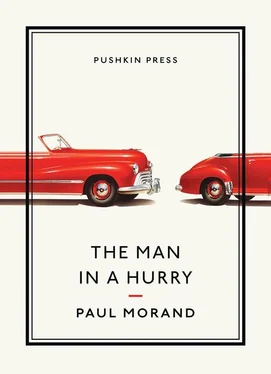Clearly, this fulfilment, this restfulness that he enjoyed when he was with Hedwige, was something he no longer required as much. Why? Was it because he knew from experience that it would be followed by a frenzy of excitement immediately afterwards? Just as the sea, momentarily calmed when drenched with oil, draws itself back all the more ferociously, scarcely had he relaxed for a few minutes in Hedwige’s presence, scarcely had he fondled her soothing hands, than a sudden reaction made him stand upright. The calm that her Creole beauty gave him was nothing but a West Indian lull. “You’re marvellous, my beloved,” he would say, but he walked straight to the front door and, once past the door, he broke into a fit of irrational agitation.
Furthermore, he could no longer bear to see the belly from which the child would not emerge, could not emerge for four months at least. These four months weighed upon Pierre, paralysed his feelings towards Hedwige and prevented him from enjoying this woman whom he loved dearly. So he staved off his hunger by visiting museum curators and by writing lots of letters, scribbling daily with an increasingly leaky pen in halting words that were rather like sparks, in which the crosses preceded the t by a mile and the dots shot off well in advance of the i ; sometimes the weary thought preceded him and he was obliged to correct the inconsistency and fill in the spaces with additions in the margin that made everything illegible. The thoughts also outstripped the words and made him reel off the end of sentences without altering the beginning. And when he shook hands he did so with a series of jolting and emotional squeezes.
The instinct that keeps the male close to his crippled female partner, however, that obliges the most fickle of animals to remain with their pregnant companions until they have given birth, drove Pierre back to Hedwige, made him stand guard beside her for entire evenings, as though summoned by an invisible force, and he would fall into a soothing slumber alongside this woman who did not sleep. But the following day, his impatience took hold of him again — his spinning like a top, his whirlwind departures, his pacing up and down the street, his sudden arrival back home making Hedwige jump, his unusual way of wandering off when he was lying beside her, interspersed with his zigzagging about and crushing insects against the window and sudden rushes to the front door.
“I’m going out,” he would say. So, out of devotion, out of caution too, so as not to leave such an impetuous husband on his own, Hedwige declared that she was quite capable of accompanying him. She was uncomfortable, however, in the tiny convertible; and if they went on foot, she became breathless trying to keep up with Pierre, in spite of his touching attempts to slow down; he was always a hundred metres ahead, which made conversation difficult. Aware that he was wearing her out, like a horse, he did his best to seek forgiveness by uttering kind words and putting on the almost feminine smile that was his great attraction.
“You follow me like my shadow, my sun.”
“Anyone would think you were running away from me,” panted an exhausted Hedwige.
And she tried hard to keep pace with Pierre, but whereas he ran, she trotted. Their rhythm was broken immediately. She was always leading with her left foot, and he with his right. He gained ground with his huge strides and would be three, and then five, chestnut trees ahead of her. She swayed in the air that he displaced; she could hear the muffled thud of his rubber heels; the breeze clung to her legs, ruffled her skirt, blew her hat off. She had to stop at the end of the pavement to let the traffic go by; he had woven his way through! He moved easily among the delivery men and scooters unloading, the children’s prams; he avoided the absent-minded man who was reading his newspaper as he walked, he steered an admirable course between the man on crutches wearing his Basque beret, the chattering nurses and the lady tugging on her constipated dog’s leash.
Hedwige could see Pierre’s back disappearing into the distance. How well she knew that back! How familiar those striding shoulders were, those conductor’s arms! Now, he was no larger than a hare. A second later, he looked like a fleeting bacillus. Hobbling among the taxis, the buses, the cyclists, along a twisting, rolling, collapsing road, she followed the tracks of the man in a hurry who had vanished. Then, all at once, worn out and having arrived at the house where she was expected, she bumped into nimble Pierre, who was on his way back.
“Have we arrived?” she asked.
“Not only have we arrived, but we’re setting off again. I’ve fixed everything, we’re going somewhere else.”
“How can one tell if one has arrived,” Hedwige said one day, “if one never stops?”
The more he rushed, the more emaciated Pierre became; he grew thinner as Hedwige filled out.
Every day, she became more resistant to anything that was not to do with her gestation, more deaf to the outside world. She enjoyed her condition intimately; she relished her physical life as a pregnant woman, she descended into that silo where her harvest was stored, with a short-sighted squint she tried to decipher something in the depths of her womb and she was already listening for the first jolts. As day followed day, she was beginning to stoop under her own weight.
She was now spending entire days in bed, not saying anything, not doing anything. A colossal and welcome weariness overcame her. Faced with so much turmoil and insufficiency, she displayed joyful resignation. Although she was languishing, she knew that beneath her indolence some very intense labour was going on; simultaneously motionless and breathtakingly active, not moving a little finger, but secretly a thousand times more impetuous than the lethargic Pierre, she was collaborating with nature with all her strength, building herself up inwardly, massaging, palpating or articulating her ribs, she was applying the pointing to this tiny living machine who would subsequently only have to distend all his limbs to become a six-foot man. A surge of dazzled amazement consumed her, which her husband failed to understand. She was adoring a sort of cryptic idol, a sacred frog in her private pond, to which she paid an obscure form of worship which Pierre was excluded from; excluded, frustrated, sent back to his manly tasks. Yet he could not help returning to her and wearying her with his demands.
One morning, she saw him coming in laden with flowers, looking affectionate.
“Darling, I have a great favour to ask you.”
“If it’s reasonable…” said Hedwige wearily.
“I’d so much like to know what’s going on inside there… to be able to pay closer attention to both of you.”
“But come on, Pierre, that’s not possible. Don’t be absurd all the time.”
“It’s not in the least absurd and, on the contrary, totally normal. I’d like an X-ray, that’s all.”
“X-rays are not made for the enjoyment of mere amateurs,” said Hedwige with a laugh. “Let me sleep now, you’re tiring me. I was kept awake all night by cramp. I don’t know how I can stretch out my poor swollen legs any more.”
Pierre kissed her and felt sorry for her, but returned to the offensive.
“Please understand me, I want to know how things are going on inside you.”
“No, no,” Hedwige replied, embarrassed and jealous of her secret.
“I want to see my child.”
“What a strange idea! How childish you are! What do you expect to see? A beam of light under a door?”
“I want to see this little creature and without further ado. Promise me,” he said in a rage.
She gave in grudgingly because these quarrels exhausted her.
The day Pierre received the large photograph stuck to a piece of card, he leapt in the air and could not contain himself.
Читать дальше












